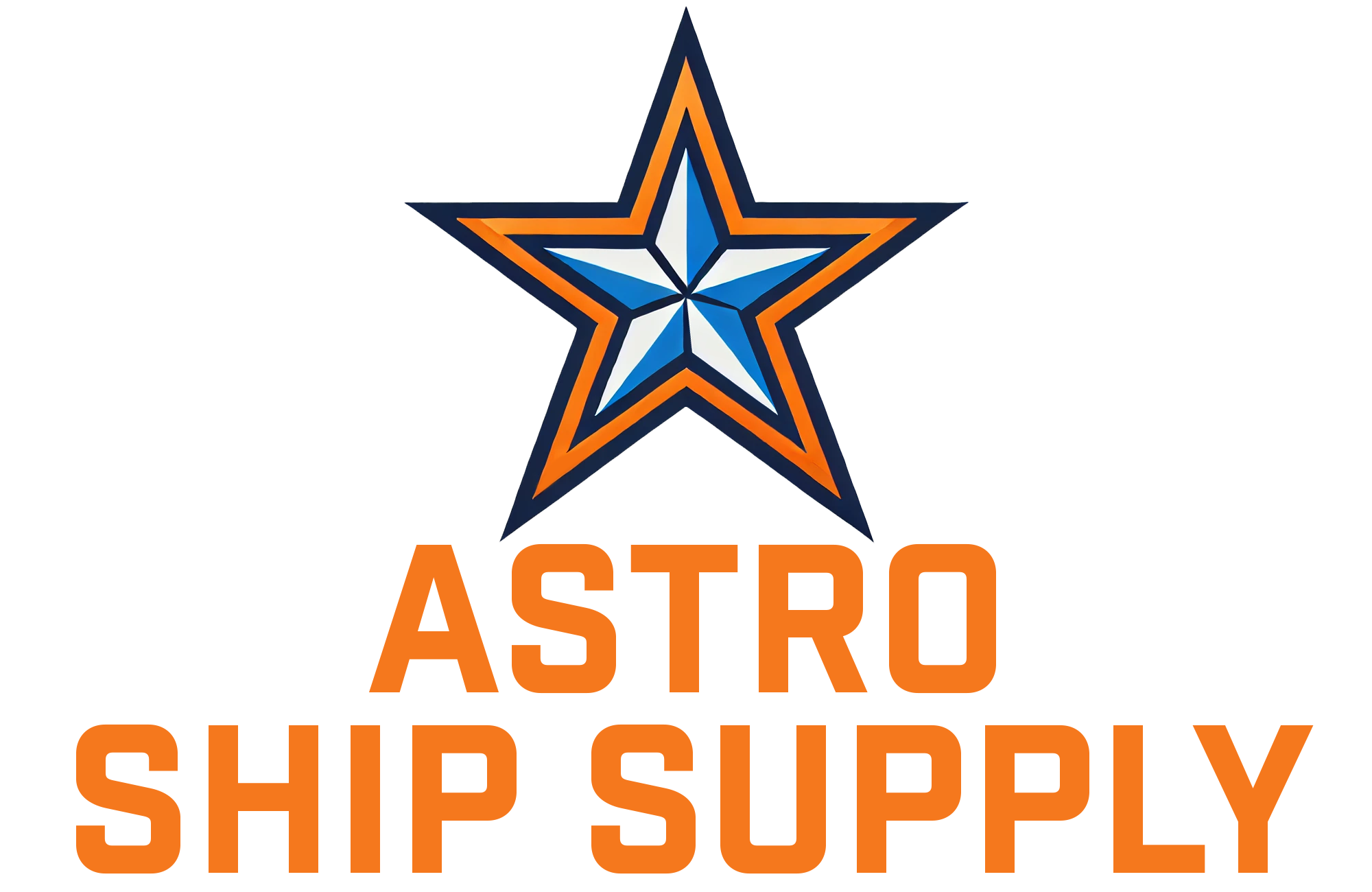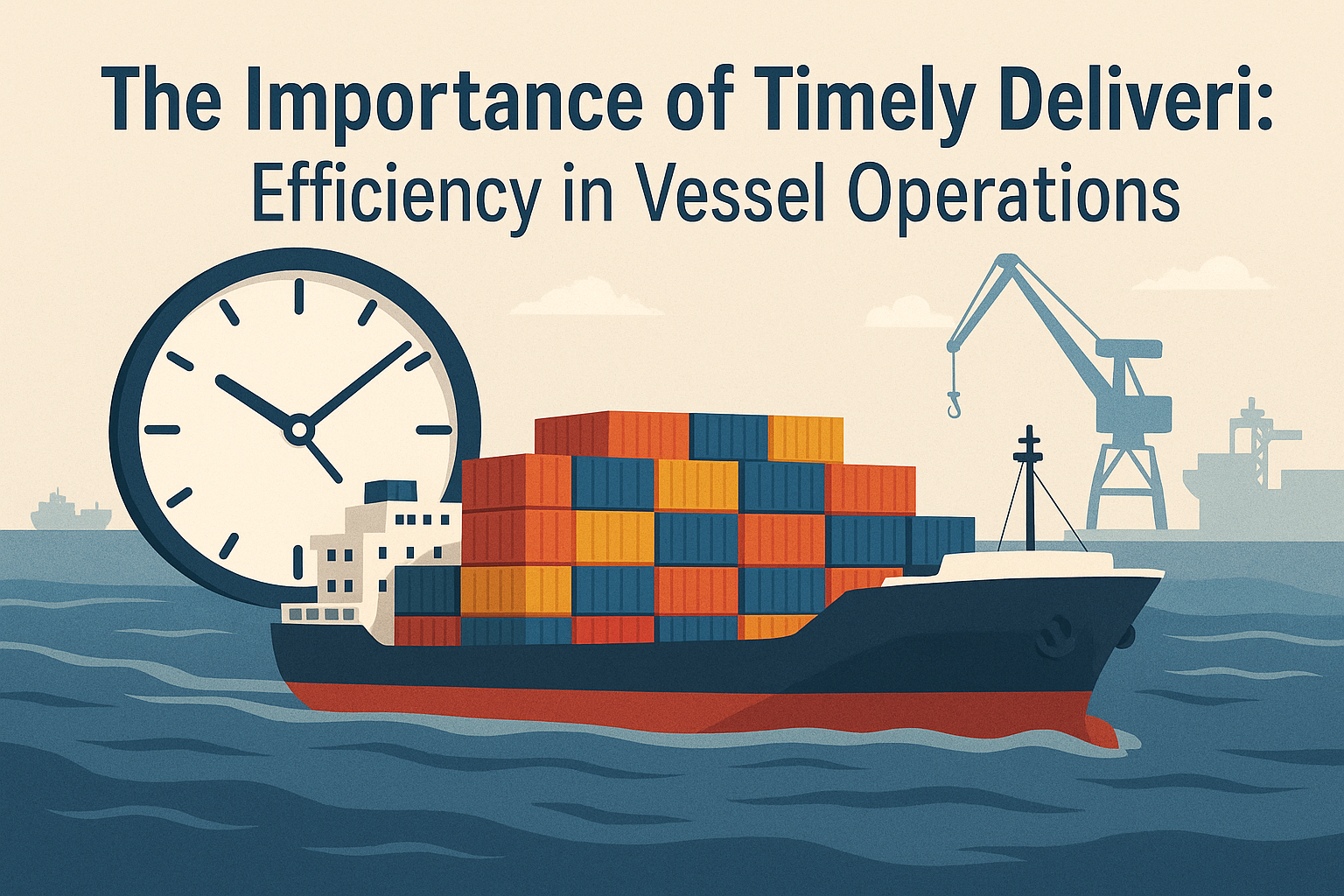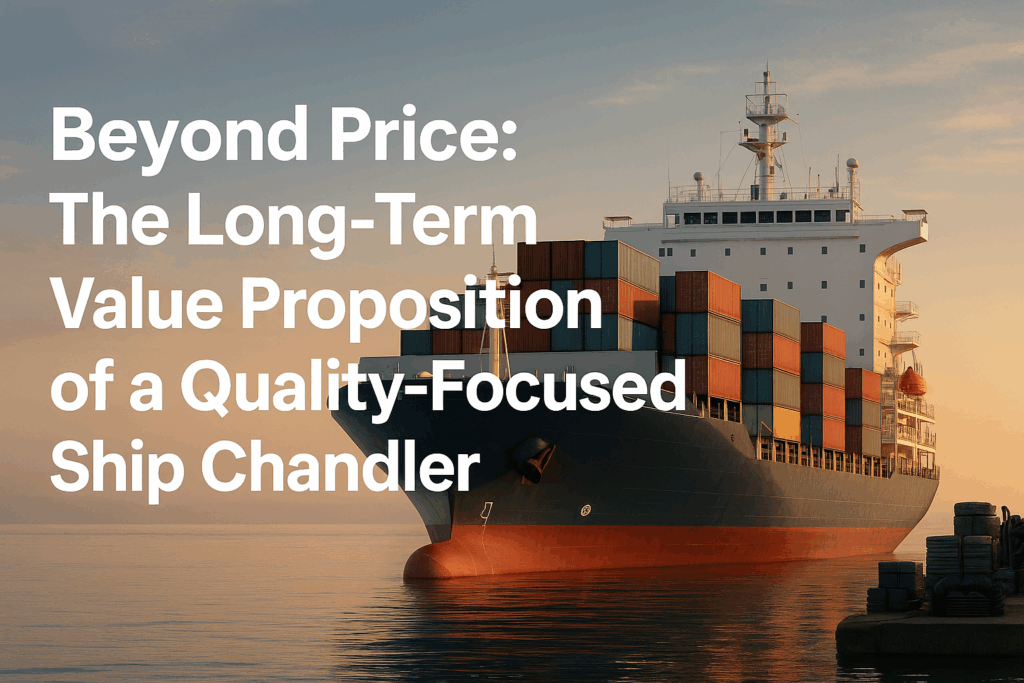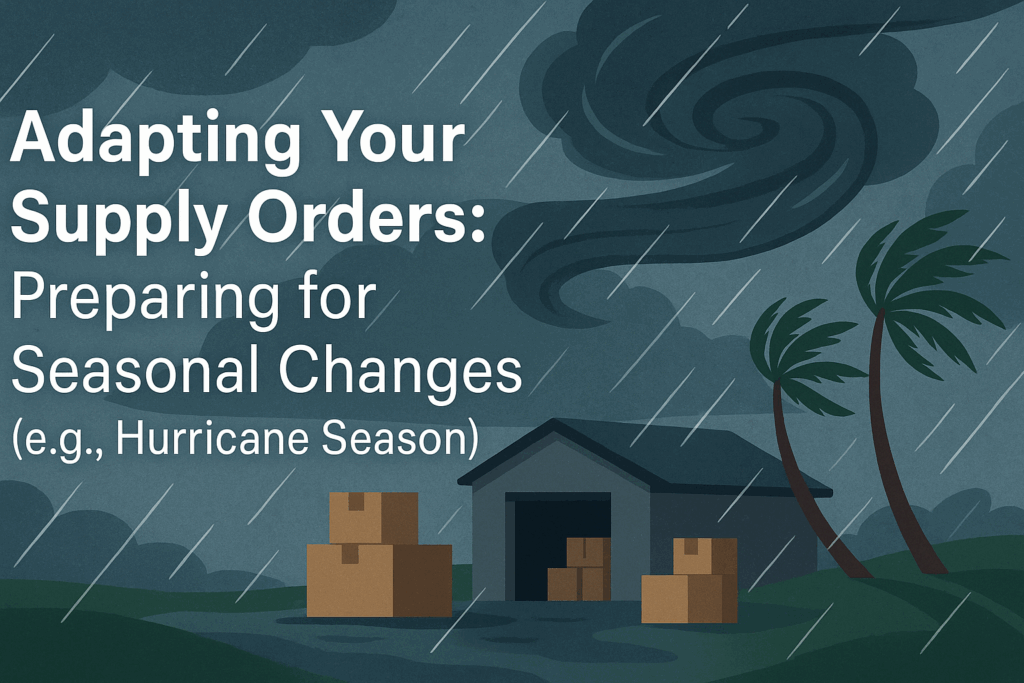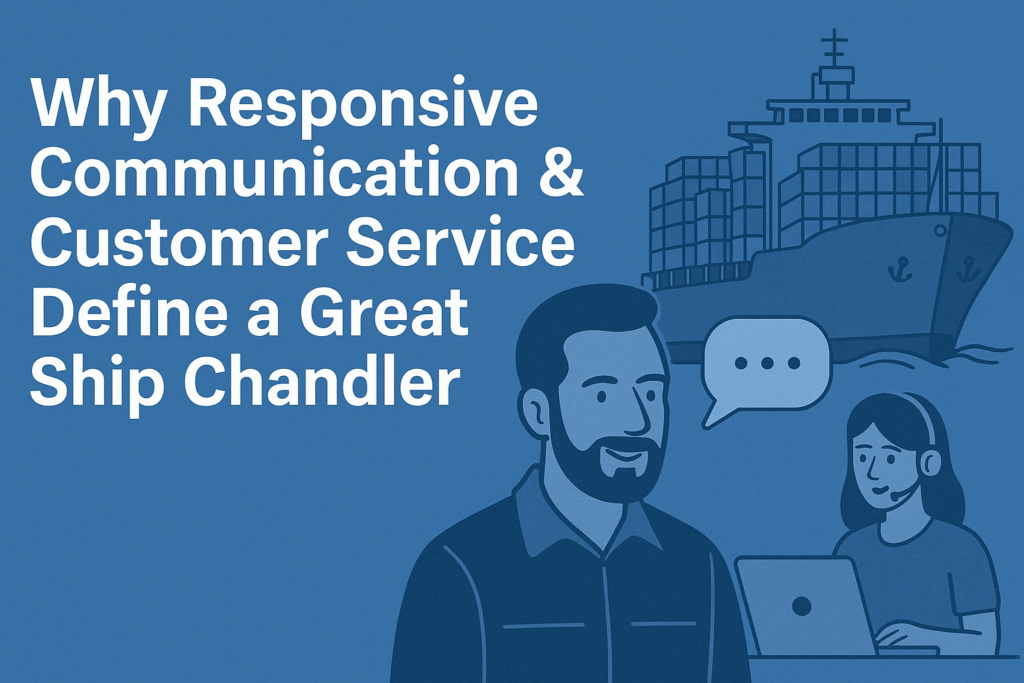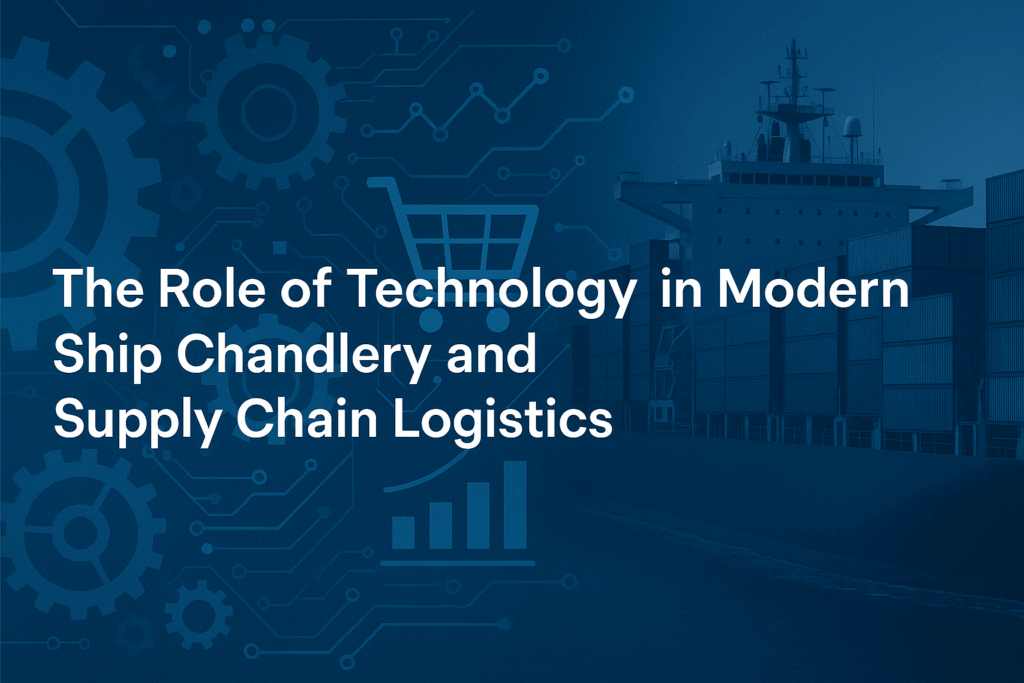More Than Just Cargo: Why Your Ship Chandler’s Clock Governs Your Voyage’s Success
Picture this: a colossal vessel, a marvel of modern engineering worth millions, sits idle at berth. Its powerful engines are silent, its sophisticated navigation systems on standby. Why? Not due to catastrophic failure or stormy seas, but because a single, critical pallet of engine spares, or perhaps essential crew provisions, missed its delivery window. In the intricate ballet of global maritime logistics, timing isn’t just important – it’s everything. A vessel’s schedule is a fragile ecosystem, and the punctuality of its supply chain, spearheaded by the ship chandler, is the unseen force that keeps it thriving or sends it spiraling into costly chaos. Moving beyond mere convenience, let’s dissect why on-time delivery by your chosen chandlery partner, like Astro Ship Supply, is a non-negotiable cornerstone of operational excellence, safety, and profitability on the high seas.
We often talk about vessel efficiency in terms of fuel consumption or cargo throughput. Yet, the efficiency of shoreside support, particularly the delivery of supplies ranging from mundane cabin stores to critical deck equipment, fundamentally dictates whether a vessel can even begin to perform optimally. Delays here aren’t isolated incidents; they initiate damaging chain reactions impacting budgets, timelines, crew well-being, and even regulatory standing.
The Crushing Weight of Waiting: Deconstructing the True Cost of Delays
Supply delays inflict far more damage than just frayed nerves. They hit the balance sheet with surprising force, manifesting in both obvious and insidious ways.
H3: The Hard Math: Beyond the Obvious Price Tag
The most immediate financial blow comes from operational standstills. Consider:
- Demurrage & Detention: The Bleeding Edge: These aren’t just fees; they’re penalties designed to be punitive. Exceeding laytime because supplies haven’t arrived can easily cost $20,000-$50,000+ *per day*. This meter runs relentlessly, turning preventable delays into staggering financial losses. A proactive chandler understands port-specific laytime rules and works meticulously to avoid triggering these charges.
- Fuel Burn on Idle: An engine at rest still consumes significant fuel powering generators for lighting, HVAC, communications, and refrigerated stores or provisions. Waiting hours for a delivery truck translates directly into wasted bunkers and increased emissions – money vanishing into thin air.
- Hidden Overheads: Delays often necessitate crew overtime, extended use of port services (tugs, pilots, linesmen), and urgent administrative interventions, adding layers of unexpected costs that erode voyage profitability.
H3: Revenue Erosion and Reputational Scars
The financial impact extends beyond direct costs, cutting into potential earnings and future business:
- Contractual Breaches (Laycan Violations): Shipping contracts hinge on specific delivery windows (Laydays/Cancelling Date). A supply delay pushing departure past the cancelling date can give charterers grounds to terminate the contract, leaving the vessel without cargo and facing potential legal action.
- Missed Opportunities: Delay at one port means potential late arrival at the next, jeopardizing the schedule for subsequent cargo loadings. This domino effect can disrupt fleet positioning and lead to lost revenue opportunities down the line.
- The High Cost of Unreliability: In a competitive market, reputation is currency. Consistent delays, even if originating from supply issues, brand an operator as unreliable. Charterers and cargo owners prioritize dependability; repeated failures drive business to competitors. Building trust requires operational precision, heavily reliant on supply chain partners who deliver as promised.
Operational Integrity: Keeping the Gears Turning Smoothly
Timely supplies are the lubricant that keeps the complex machinery of vessel operations running without friction.
H3: Port Call Precision: The Choreography of Turnaround
Ports like Houston are high-throughput environments where every minute counts. Berths are scheduled back-to-back, and ancillary services operate on tight timelines. Supply delays throw a wrench into this complex choreography:
- Berth Congestion & Scheduling Conflicts: A vessel overstaying its welcome due to waiting for supplies occupies valuable space, potentially delaying other vessels and incurring the port authority’s displeasure (and fees).
- Disrupted Ancillary Services: Delayed departures mess with pilotage schedules, tug availability, and linesmen deployment, potentially causing further hold-ups even after supplies arrive.
- Inefficient Cargo Handling: If essential lashing materials, dunnage, or safety equipment related to cargo operations are part of the delayed delivery, cargo work itself can be halted, further extending port stay and costs.
Efficient turnaround, enabled by suppliers who integrate seamlessly with the vessel’s schedule, is paramount. It requires chandlers with deep knowledge of port operations and logistics, capable of navigating potential bottlenecks like local traffic or terminal procedures.
H3: Crew Readiness: Fueling Performance and Safety
Focusing solely on the vessel neglects the critical human element. The crew’s ability to perform safely and efficiently is directly linked to the timely provision of their needs:
- Sustenance and Stamina: Beyond basic morale, consistent access to fresh, high-quality provisions fuels physical and mental performance. Delays leading to rationing or poor-quality food directly impact crew alertness, decision-making, and their ability to handle demanding tasks safely. Adherence to standards like HACCP isn’t just compliance; it’s ensuring the crew receives safe, energy-giving food.
- Tools for the Job: Timely delivery of requested deck tools, engine spares, or even basic Personal Protective Equipment (PPE) ensures the crew can carry out maintenance and operations effectively and safely. Waiting for a specific filter or pair of safety gloves can halt essential work.
- Rest and Well-being: While bonded stores might seem secondary, access to familiar comforts contributes to psychological well-being during long voyages. More critically, delays impacting crew change schedules cause fatigue and frustration, demonstrably increasing safety risks.
Safety & Compliance: Where Timeliness is Non-Negotiable
In the heavily regulated maritime world, timely supply often intersects directly with legal and safety mandates.
H3: Critical Failures: When Missing Supplies Halt Operations
Certain items aren’t just ‘needed’; they are essential for safe and legal operation. Delay in receiving these can bring everything to a grinding halt:
- Showstopper Spares: A needed purifier spare, a critical pump component, or a navigation system part identified mid-voyage must be onboard before potential failure or arrival at the next port. Delay means risking breakdown or failing inspections.
- Mandatory Safety Equipment: Expired medical supplies, depleted firefighting recharges, or items needed for lifeboat servicing aren’t optional. Lack of these can lead to immediate Port State Control (PSC) detention, a costly and reputation-damaging event. Compliance with codes like ISPS also requires certain security-related supplies to be readily available.
- Environmental Compliance Gear: Items required under MARPOL, such as specific oil spill response materials or consumables for exhaust gas cleaning systems (scrubbers), must be replenished promptly to avoid compliance breaches and potential fines.
H3: Navigating the Regulatory Maze
Compliance extends beyond major equipment. Timely delivery ensures:
- Correct Documentation Onboard: Official logbooks, specific regulatory manuals, or updated nautical charts often arrive via the chandler. Delays can cause issues during audits.
- Inspection Readiness: Supplies themselves must meet standards. Food safety (Texas DSHS compliance, HACCP), quality management (ISO 9001:2015), and even correct labeling are scrutinized. A reliable chandler ensures delivered goods won’t cause inspection failures.
- Customs Preparedness: Efficient suppliers understand U.S. Customs and Border Protection requirements for ship’s stores, preparing documentation correctly to avoid customs holds – a common source of frustrating delays.
Case Study: The Tale of Two Turnarounds in Houston
Let’s contrast two hypothetical scenarios involving similar vessels requiring provisions, bonded items, and a specific engine valve at the Port of Houston:
H3: Voyage ‘Prosperity’ – Partnered with a Proactive Chandler
M/V Prosperity’s agent confirms the order with ‘Chandler Alpha’ (embodying Astro Ship Supply’s principles) three days before ETA. Alpha confirms stock, prepares customs docs electronically, and reserves a delivery slot coordinating with the agent and terminal. The critical valve is sourced locally and expedited. Upon vessel berthing, Alpha’s truck, having navigated port traffic efficiently, is waiting. Provisions (quality checked, HACCP compliant), bonded stores, and the valve are loaded swiftly alongside cargo ops. Customs clearance is smooth. Prosperity departs ahead of schedule, crew satisfied, budget intact.
H3: Voyage ‘Setback’ – Gambling with an Unreliable Supplier
M/V Setback’s agent places a similar order with ‘Chandler Beta’ two days out. Beta confirms late, struggles to locate the valve, and submits incomplete customs paperwork. On arrival day, Beta’s truck is delayed (“traffic”), then held by customs due to paperwork issues. Cargo ops finish, but Setback waits. Six hours later, supplies finally arrive – provisions look tired, the valve box is damaged (requiring inspection). Demurrage clocks in. Crew shore leave is cut short. The vessel finally sails late, needing extra speed (and fuel) to chase the schedule, facing potential penalties at the next port.
The difference? Not just luck, but the chandler’s proactivity, expertise, communication, and robust processes.
The Strategic Chandler: Elevating Supply from Task to Partnership
Choosing a ship chandler shouldn’t be a race to the bottom on price. It’s about selecting a strategic partner invested in your vessel’s operational success. A top-tier chandler excels through:
- Anticipatory Logistics: Leveraging experience and communication to foresee needs, not just react to orders. Understanding vessel routes and typical consumption patterns.
- Mastery of the ‘Last Mile’: Deep local knowledge of ports (terminals, traffic, procedures), strong relationships with authorities, and reliable, owned/dedicated transport.
- Quality as an Efficiency Driver: Implementing rigorous quality controls (ISO 9001, HACCP) isn’t just about good products; it prevents delays caused by rejection or compliance failures.
- Seamless Communication: Providing 24/7 accessibility and transparent updates, acting as an extension of the vessel management team.
- Problem-Solving Prowess: Resourcefulness in sourcing difficult items quickly and navigating unexpected logistical hurdles.
Actionable Insights: On-Time Supply as Competitive Advantage
- Punctuality is Profitability: Directly correlates to minimizing demurrage, fuel waste, and contractual penalties.
- Efficiency is Holistic: Smooth supply enables optimized port time, better crew performance, and reliable scheduling.
- Safety & Compliance Depend On It: Critical items must arrive on time to avoid detentions and ensure operational integrity.
- Your Chandler Reflects On You: Their reliability (or lack thereof) impacts your reputation with charterers and ports.
- Invest in Partnership, Not Just Price: A proactive, quality-focused chandler delivers value far exceeding the cost difference.
Conclusion: Make Timeliness Your Maritime Mantra
In the relentless pace of modern shipping, efficiency is the key differentiator. Timely, reliable ship supply is not merely a supporting function; it is a fundamental driver of that efficiency, directly impacting operational viability, safety standards, and financial health. The consequences of delays resonate far beyond the quayside, affecting global supply chains and bottom lines.
By recognizing the strategic importance of punctuality and choosing ship supply partners like Astro Ship Supply, who embed timeliness and quality into their core operations, vessel owners and operators can actively mitigate risks, enhance performance, and navigate the complexities of maritime logistics with greater confidence and success. Don’t let your voyages be dictated by delays; ensure your vessel is always ready. Request your quote today and experience the difference proactive supply makes.
Frequently Asked Questions (FAQ)
What are the *most disruptive* types of ship supply delays?
While any delay is problematic, the most disruptive often involve: 1) Critical spares needed for immediate repairs (potential vessel stoppage), 2) Mandatory safety/compliance items holding up departure clearance (PSC detentions), and 3) Customs holds due to incorrect paperwork prepared by the supplier, which can take significant time to resolve.
How does a ship chandler’s local knowledge (e.g., in the Gulf Coast) impact delivery times?
Local knowledge is crucial. Understanding port-specific terminal layouts, traffic patterns (especially around major hubs like Houston), gate procedures, security protocols (ISPS), and having established relationships with port officials and customs agents allows a local chandler to anticipate bottlenecks and navigate the ‘last mile’ delivery much more efficiently than an unfamiliar supplier.
Can using a cheaper, less established chandler actually cost more in the long run?
Absolutely. While the initial quote might be lower, a less reliable chandler is more prone to causing delays (leading to demurrage, extra fuel burn), delivering poor quality goods (requiring replacement, causing further delays), or failing on compliance aspects (risking fines/detentions). The potential costs incurred from these issues often far outweigh any initial savings on the supply quote itself.
How important are certifications like ISO 9001 and HACCP for ensuring timely delivery?
These certifications are strong indicators of process reliability. ISO 9001 suggests robust quality management systems, meaning fewer errors in ordering, handling, and documentation, leading to smoother logistics. HACCP ensures food safety processes are followed, drastically reducing the risk of provisions being rejected upon delivery due to spoilage or contamination, thus preventing re-delivery delays. They signify a commitment to operational excellence that typically correlates with punctuality.
What’s the single most important factor when choosing a ship chandler for reliable delivery?
While factors like price, range, and quality are important, **proven reliability** backed by strong communication and local operational expertise is arguably the most critical for ensuring timely delivery. Look for established track records, positive testimonials (if available), relevant certifications, and clear evidence of proactive communication and logistical planning capabilities (like 24/7 support).
